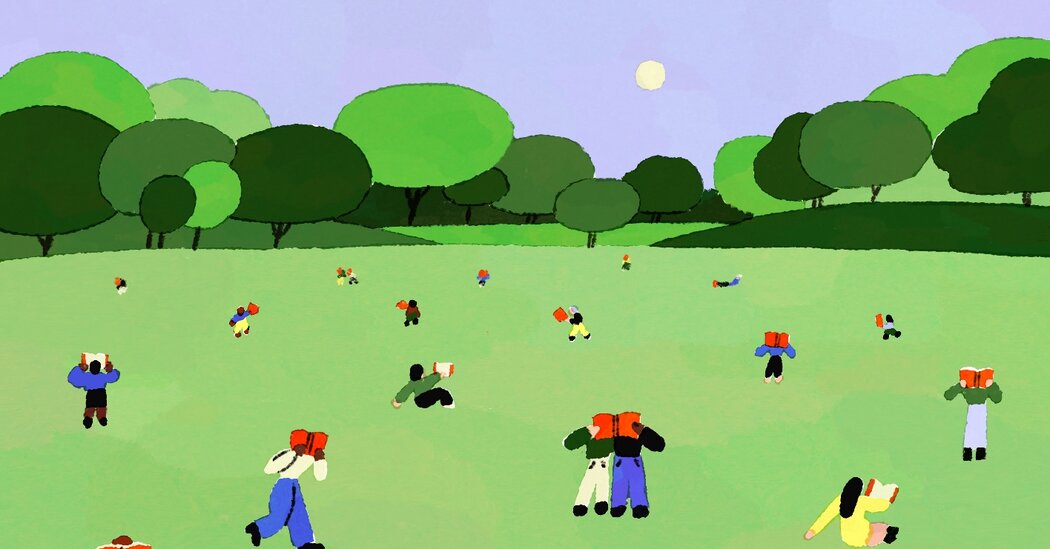Times Insider explains who we are and what we do and delivers behind-the-scenes insights into how our journalism comes together.
For more than 20 years, A.O. Scott, who was until recently a co-chief film critic for The New York Times, had a routine.
Look at the movies he’d been assigned to review for the week. Go to a screening. File a review the next morning. Rinse. Repeat.
But now, since pivoting to a role as a critic at large for The Times Book Review in 2023, Mr. Scott, 58, has been able to step back from the deadline grind and focus on his passions: Rereading classic novels. Defending bad commencement speeches. Demystifying poetry.
Since last November, Mr. Scott, who has a bachelor’s degree in literature from Harvard University, has written a popular monthly column that scrutinizes a single poem, examining it line by line. He recently expanded the exercise into a weeklong challenge, in which readers were asked to memorize a poem as a way to soothe their nerves or “grant a moment of simple happiness,” Mr. Scott wrote.
“I do think that it is something that people want, and in a way, something that we’ve maybe helped them discover that they want,” Mr. Scott said in a recent interview in the Book Review office, where Stephen King’s “Holly” and Samantha Harvey’s “Orbital” sit on a bookshelf behind him.
In an hourlong conversation, Mr. Scott outlined his goals for his new beat and why he thinks readers enjoy being asked to slow down and spend time with a piece of writing. These are edited excerpts from the conversation.
Did you ever think you’d write such a popular column about poetry?
When I moved to the Book Review, the idea was to do essays and reviews on various literary topics. I never would have guessed that poetry would have been a big part of it. But when we started doing these interactive pieces about short poems that were brief but intensive, people responded with great enthusiasm. And they kept saying, “Can you do more of this?” It’s an experimental approach to criticism. We kind of make it up as we go along.
Why did you want to return to writing about books?
I’d always liked writing about literature, and I did want to get back to that. But I also wanted to see if there were formats and approaches that I could work on other than a review. Most of what I did as a film critic was review new movies, which was a lot of fun, but also came to feel like a treadmill. It was hundreds and hundreds of pieces a year, and weekly deadlines.
What does a day look like for you now?
I spend a lot of time reading poems, which is heaven. A lot of the work involved in my poetry pieces is about finding the right ones. The poems have to be short enough — and skinny enough — so you can read them on your phone. They can’t be too difficult, but they need a little bit of work or interpretation. Also, now that my beat is books, I’m just trying to keep up and catch up, as I did with movies.
What are you reading right now?
I have a lot of books piled up. There’s a gigantic new Mark Twain biography — it’s more than 1,000 pages long. And then I’m following the “Great Gatsby” project with other 100-year-old books. The next one I want to do is “Mrs. Dalloway” by Virginia Woolf, which was also published in 1925, so I’ve been rereading that and reading pieces about the book.
How had the literary world changed since you left it?
It’s like walking into your old neighborhood and seeing that it hasn’t changed all that much. Some of the storefronts are different, but the landmarks are all there. And there’s still always too much to read. I mean, if I thought it was hard to stay caught up with movies, with books — which have been around for thousands of years more, and which are published in much greater quantities — I give up on the idea.
Did you always love poetry?
Like a lot of people, I got into it through popular music: in my case, listening to Bob Dylan, and being interested in what he was doing as a songwriter and a lyricist. As a teenager, I started reading poems, and sometimes tried to write poems. Even when I was reviewing movies for all those years, I was reading poetry almost every day.
How did it influence your film reviews?
As a writer, you’re always looking for interesting examples of language as a way of refreshing your own relationship to the language. So I certainly read a lot of other critics, but sometimes I would feel like, “I need another idea of what writing can be, of the possibilities of the English language.” Poetry is a great source of that, because it’s an approach to writing and the language that’s certainly different from journalism or criticism. It can remind you of just how much possibility, how much play there is when you’re writing.
You’ve gotten America hooked on poetry through your column. Why do you think such a decidedly analogue experience has resonated with so many people?
There’s a desire to reclaim and remaster your own attention. I also think we’re so conditioned to think that everything needs to be productive, or to have a use or an application, that we cheat ourselves out of a certain amount of aesthetic experience. So I think if people are invited to spend two minutes reading a poem, and let themselves feel it without worrying about how they’re supposed to think about it, or how it will count in their life — they’ll embrace that.
